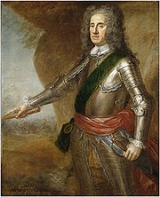
List of Governors of Edinburgh Castle
Encyclopedia
The Governor of Edinburgh Castle
, also sometimes known as the Keeper or Captain, had overall control of the Royal castle of Edinburgh
, Scotland
. The Governor was usually assisted by a Deputy-Governor and a Constable, the latter being under the command of the Lord High Constable of Scotland
. The Governor had lodgings within the Castle, with a Governor's House being built in 1742. Although the post was never formally abolished, Governors ceased to be appointed after the death of Henry Dundas, 3rd Viscount Melville
in 1876. The office was revived in 1936 as an honorary title for the General Officer Commanding
of Scottish Command
, and is currently held by Major General David Shaw.
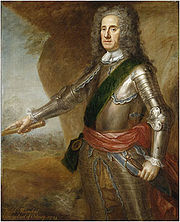
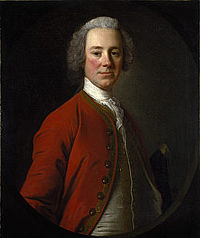
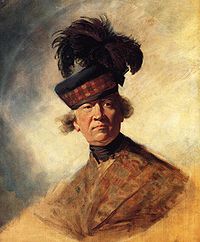
The castle was in English hands from 1291 to 1314, during the Wars of Scottish Independence
Following the Castle's recapture by the Scots under William Douglas
in 1314, it was slighted
and unused until the English returned in 1333.
The castle was again recaptured by the Scots in 1341.
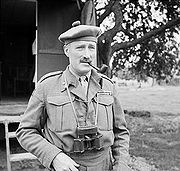
Edinburgh Castle
Edinburgh Castle is a fortress which dominates the skyline of the city of Edinburgh, Scotland, from its position atop the volcanic Castle Rock. Human habitation of the site is dated back as far as the 9th century BC, although the nature of early settlement is unclear...
, also sometimes known as the Keeper or Captain, had overall control of the Royal castle of Edinburgh
Edinburgh
Edinburgh is the capital city of Scotland, the second largest city in Scotland, and the eighth most populous in the United Kingdom. The City of Edinburgh Council governs one of Scotland's 32 local government council areas. The council area includes urban Edinburgh and a rural area...
, Scotland
Scotland
Scotland is a country that is part of the United Kingdom. Occupying the northern third of the island of Great Britain, it shares a border with England to the south and is bounded by the North Sea to the east, the Atlantic Ocean to the north and west, and the North Channel and Irish Sea to the...
. The Governor was usually assisted by a Deputy-Governor and a Constable, the latter being under the command of the Lord High Constable of Scotland
Lord High Constable of Scotland
The Lord High Constable is a hereditary, now ceremonial, office of Scotland. In the order of precedence of Scotland, the office traditionally ranks above all titles except those of the Royal Family. The Lord High Constable was, after the King of Scots, the supreme officer of the Scottish army. He...
. The Governor had lodgings within the Castle, with a Governor's House being built in 1742. Although the post was never formally abolished, Governors ceased to be appointed after the death of Henry Dundas, 3rd Viscount Melville
Henry Dundas, 3rd Viscount Melville
Henry Dundas, 3rd Viscount Melville GCB was a British military leader.- Military career :The eldest son of Robert Dundas, 2nd Viscount Melville, he was captain of the 83rd Regiment from 1824, and was active in suppressing the Canadian rebellion in 1837...
in 1876. The office was revived in 1936 as an honorary title for the General Officer Commanding
General Officer Commanding
General Officer Commanding is the usual title given in the armies of Commonwealth nations to a general officer who holds a command appointment. Thus, a general might be the GOC II Corps or GOC 7th Armoured Division...
of Scottish Command
Scottish Command
-History:The Command was established in 1905 at Edinburgh Castle but moved to Craigiehall in the early 1950s.Since 1936 the General Officer Commanding Scottish Command has also always been appointed Governor of Edinburgh Castle....
, and is currently held by Major General David Shaw.
Governors of Edinburgh Castle



- 1251-?: Walter Comyn, Earl of Menteith (d.1258)
- ...
The castle was in English hands from 1291 to 1314, during the Wars of Scottish Independence
Wars of Scottish Independence
The Wars of Scottish Independence were a series of military campaigns fought between the independent Kingdom of Scotland and the Kingdom of England in the late 13th and early 14th centuries....
- 1291-1296: Sir Ralph Basset de Drayton, English governor
- 1296-1298: Sir Walter de Huntercombe, English governor
- 1298-?: Sir John de Kingston, English governor
- ...
Following the Castle's recapture by the Scots under William Douglas
William Douglas, Lord of Liddesdale
Sir William Douglas, Lord of Liddesdale was also known as the Knight of Liddesdale and the Flower of Chivalry. He was a Scottish nobleman and soldier active during the Second War of Scottish Independence.-Family:...
in 1314, it was slighted
Slighting
A slighting is the deliberate destruction, partial or complete, of a fortification without opposition. During the English Civil War this was to render it unusable as a fort.-Middle Ages:...
and unused until the English returned in 1333.
- ...
- 1338-1341: Sir Thomas de Rokeby, English governor
The castle was again recaptured by the Scots in 1341.
- ...
- 1346: Sir David de Lindsay, Lord of Crawford
- 1350-?: Sir Robert Erskine of Alva
- 1360-?: John MacDonald, Lord of the IslesJohn of Islay, Lord of the IslesJohn of Islay was the Lord of the Isles and chief of Clan Donald. In 1336, he styled himself Dominus Insularum, "Lord of the Isles"; because this is the first ever recorded instance of the title in use, modern historians count John as the first of the later medieval Lords of the Isles, although...
- 1361-1364: Archibald the Grim
- ...
- c.1375-1382 Sir John Lyon
- ...
- c.1400: David Stewart, Duke of RothesayDavid Stewart, Duke of RothesayDavid Stewart was the heir to the throne of Scotland from 1390 and the first Duke of Rothesay from 1398. He also held the titles of Earl of Atholl and Earl of Carrick...
- ...
- 1420: Sir William Borthwick 'the younger', 2nd of Borthwick
- ...
- 1437-?: Sir William CrichtonWilliam Crichton, 1st Lord CrichtonWilliam Crichton, 1st Lord Crichton of Sanquhar was an important political figure in Scotland.He held various positions within the court of James I. At the death of James I, William Crichton was Sheriff of Edinburgh, Keeper of Edinburgh Castle, and Master of the King’s household...
- ...
- 1466: Sir Alexander Boyd
- ...
- 1488-?: Patrick Hepburn, 1st Earl of BothwellPatrick Hepburn, 1st Earl of BothwellPatrick Hepburn, 1st Earl of Bothwell was Lord High Admiral of Scotland. Under his territorial designation of Sir Patrick Hepburne of Dunsyre, Knt., he was Sheriff of Berwickshire, 15 June 1480...
- ...
- c.1515-after 1524: James Hamilton, 1st Earl of ArranJames Hamilton, 1st Earl of ArranJames Hamilton, 1st Earl of Arran and 2nd Lord Hamilton was a Scottish nobleman and first cousin of James IV of Scotland.-Biography:...
- ...
- c.1559 – 19 March 1566: John Erskine, 17th Earl of MarJohn Erskine, 17th Earl of MarJohn Erskine, 17th Earl of Mar , regent of Scotland, was a son of John, 5th Lord Erskine, who was guardian of King James V, and afterwards of Mary, Queen of Scots....
- 1566-1567:James Cockburn of Skirling
- 1567-1568:Sir James Balfour of PittendreichJames Balfour of PittendreichJames Balfour, Lord Pittendreich was a Scottish judge and politician.The son of Sir Michael Balfour of Montquhanny, he was educated for the legal branch of the Church of Scotland...
- 1568-1573: Sir William Kirkcaldy of GrangeWilliam Kirkcaldy of GrangeSir William Kirkcaldy of Grange , Scottish politician and general, was the eldest son of Sir James Kirkcaldy of Grange , a member of an old Fife family...
, defended the castle for Mary, Queen of Scots, during the "Lang Siege" - 1574-?: George Douglas of Parkhead
- 16 March 1578 – ?: Sir Alexander Erskine of Gogar
- 1584: James Stewart, Earl of ArranJames Stewart, Earl of ArranCaptain James Stewart, Earl of Arran was created Earl of Arran by the young King James VI, who wrested the title from James Hamilton, 3rd Earl of Arran...
- ...
- 1600?: Andrew Stewart, 3rd Lord OchiltreeLord OchiltreeLord Ochiltree of Lord Stuart of Ochiltree was a title in the Peerage of Scotland. In 1542 Andrew Stewart, 2nd Lord Avondale exchanged the lordship of Avondale with Sir James Hamilton for the lordship of Ochiltrie and by Act of Parliament was ordained to be styled Lord Stuart of Ochiltrie...
- ...
- 1615-1638: John Erskine, 19th Earl of Mar
- 1638-?: John Elphinstone, 2nd Lord BalmerinoJohn Elphinstone, 2nd Lord BalmerinoJohn Elphinstone, 2nd Lord Balmerino was a Scottish aristocrat, convicted in a celebrated trial of the 1630s which became a crux of the religious issue of the time.-Early life:...
- 1640: Sir Patrick RuthvenPatrick Ruthven, 1st Earl of BrentfordPatrick Ruthven, 1st Earl of Brentford and 1st Earl of Forth was a Scottish nobleman, general, and diplomat.Patrick Ruthven distinguished himself in the service of Sweden, which he entered about 1609 and left 1637...
- 1641-?: Alexander Leslie, 1st Earl of LevenAlexander Leslie, 1st Earl of LevenAlexander Leslie, 1st Earl of Leven was a Scottish soldier in Dutch, Swedish and Scottish service. Born illegitimate and raised as a foster child, he subsequently advanced to the rank of a Dutch captain, a Swedish Field Marshal, and in Scotland became lord general in command of the Covenanters,...
- 1645-?: Alexander Lindsay, 1st Earl of BalcarresAlexander Lindsay, 1st Earl of BalcarresAlexander Lindsay, 2nd Lord Balcarres and 1st Earl of Balcarres was a Scottish nobleman.The eldest son of David Lindsay, 1st Lord Balcarres, and grandson of John Lindsay, Lord Menmuir....
- 1648: James Hamilton, 1st Duke of HamiltonJames Hamilton, 1st Duke of HamiltonGeneral Sir James Hamilton, 1st Duke of Hamilton KG was a Scottish nobleman and influential Civil war military leader.-Young Arran:...
- 1650: Colonel Walter Dundas of Dundas
- 1650: George Fenwick, appointed by Oliver CromwellOliver CromwellOliver Cromwell was an English military and political leader who overthrew the English monarchy and temporarily turned England into a republican Commonwealth, and served as Lord Protector of England, Scotland, and Ireland....
following his capture of the Castle - 1651-1652: Major-General Robert OvertonRobert OvertonMajor-General Robert Overton was prominent soldier and scholar, who supported the Parliamentary cause during the English Civil War, and was imprisoned a number of times during the Protectorate and the English Restoration for his strong republican views.-Biography:As positions hardened during the...
, appointed by Cromwell - ...
- 1661-?: John Middleton, 1st Earl of MiddletonJohn Middleton, 1st Earl of MiddletonJohn Middleton, 1st Earl of Middleton was a Scottish army officer, who belonged to a Kincardineshire family which had held lands at Middleton since the 12th century....
- 1663-?: John Maitland, 1st Duke of LauderdaleJohn Maitland, 1st Duke of LauderdaleSir John Maitland, 1st Duke and 2nd Earl of Lauderdale, 3rd Lord Thirlestane KG PC , was a Scottish politician, and leader within the Cabal Ministry.-Background:...
- 1664: Colonel James Murray
- ...
- 1682-1686: William Douglas, 1st Duke of QueensberryWilliam Douglas, 1st Duke of QueensberryWilliam Douglas, 1st Duke of Queensberry PC also 3rd Earl of Queensberry and 1st Marquess of Queensberry was a Scottish politician....
- 1686-1689: George Gordon, 1st Duke of GordonGeorge Gordon, 1st Duke of GordonGeorge Gordon, 1st Duke of Gordon KT, PC , known as Marquess of Huntly from 1661 to 1684, was a Scottish peer....
, defended the castle for the exiled James VIIJames II of EnglandJames II & VII was King of England and King of Ireland as James II and King of Scotland as James VII, from 6 February 1685. He was the last Catholic monarch to reign over the Kingdoms of England, Scotland, and Ireland... - ...
- 1702-1704: William Douglas, 1st Earl of March
- ...
- 1712-1714: John Campbell, 2nd Duke of ArgyllJohn Campbell, 2nd Duke of ArgyllField Marshal John Campbell, 2nd Duke of Argyll, 1st Duke of Greenwich KG , known as Iain Ruaidh nan Cath or Red John of the Battles, was a Scottish soldier and nobleman.-Early Life:...
- 1714-1737: George Hamilton, 1st Earl of OrkneyGeorge Hamilton, 1st Earl of OrkneyField Marshal George Douglas-Hamilton, 1st Earl of Orkney KT was a British soldier and Scottish nobleman and the first British Army officer to be promoted to the rank of Field Marshal. The son of the Duke and Duchess of Hamilton, he fought for William of Orange in Ireland and the Low Countries...
- 1737-1738: Charles Douglas, 2nd Earl of Selkirk
- 1738-1739: Sir James Campbell of Lawers
- 1739-?: George Ross, 13th Lord RossGeorge Ross, 13th Lord RossGeorge Ross, 13th Lord Ross of Halkhead , was a Scottish nobleman.-Origins:Ross was the eldest son and heir of William Ross, 12th Lord Ross, who died in 1738, by Agnes, daughter and heiress of Sir John Wilkie of Fouldean...
- ...
- 1745–1752: Lord Mark Kerr
- 1752–1763: Humphry Bland
- 1763–1782: John Campbell, 4th Earl of LoudounJohn Campbell, 4th Earl of LoudounMajor-General John Campbell, 4th Earl of Loudoun was a British nobleman and army officer.-Early career:Campbell inherited the peerage on the death of his father in 1731, becoming Lord Loudoun. The earl raised a regiment of infantry that took part in the Jacobite Rising of 1745 on the side of the...
- 1782–1796: Archibald Montgomerie, 11th Earl of EglintonArchibald Montgomerie, 11th Earl of EglintonArchibald Montgomerie, 11th Earl of Eglinton was a Scottish General, and Member of Parliament in the British Parliament. He was also the Clan Chief of the Clan Montgomery. Montgomerie fought in the Seven Years' War, where he served with George Washington...
- 1796–1801: Lord Adam Gordon
- 1801–1827: Sir Robert AbercrombyRobert Abercromby of AirthreyGeneral Sir Robert Abercromby GCB , the youngest brother of Sir Ralph Abercromby, was a general in the army, a knight of the Bath, and at one period the governor of Bombay and commander-in-chief of the British forces in India.-Military career:...
- 1827–1836: George Gordon, 5th Duke of GordonGeorge Gordon, 5th Duke of GordonGeorge Gordon, 5th Duke of Gordon GCB, PC , styled Marquess of Huntly until 1827, was a Scottish nobleman, soldier and politician and the last of his illustrious line.-Early life:...
- 1836–1837: Major-General Hon. Patrick Stuart
- 1837–1842: Major-General Lord GreenockCharles Cathcart, 2nd Earl CathcartCharles Murray Cathcart, 2nd Earl Cathcart GCB was a British Army general who became Governor General of the Province of Canada and Lieutenant Governor of Canada West .-Life:Cathcart, eldest surviving son of William Schaw Cathcart, 1st Earl Cathcart, was born at...
- 1842–1847: Lieutenant-General Sir Neil Douglas
- 1847–1852: Major-General Henry Riddell
- 1852–1854: Sir Thomas Erskine Napier
- vacant; Melville appointed retroactive to 1855
- 1860–1876: Henry Dundas, 3rd Viscount MelvilleHenry Dundas, 3rd Viscount MelvilleHenry Dundas, 3rd Viscount Melville GCB was a British military leader.- Military career :The eldest son of Robert Dundas, 2nd Viscount Melville, he was captain of the 83rd Regiment from 1824, and was active in suppressing the Canadian rebellion in 1837...
Modern governors

- 1936–1937 General Sir Archibald Cameron of LocheilArchibald Rice CameronGeneral Sir Archibald Rice Cameron of Locheil GBE KCB CMG was a British Army General during the 1930s.-Military career:...
- 1937–1940 General Sir Charles GrantCharles Grant (British Army officer)General Sir Charles John Cecil Grant KCB KCVO DSO was a British Army General during World War II.-Military career:Charles Grant was commissioned into the Coldstream Guards in 1897...
- 1940–1941 Lieutenant-General Harold CarringtonHarold CarringtonLieutenant General Sir Robert Harold Carrington KCB DSO was a British Army General during World War II.-Military career:Harold Carrington was commissioned into the Royal Field Artillery in 1901; he served in the Second Boer War between 1901 and 1902 and then transferred to the Royal Horse...
- 1941–1945 Lieutenant-General Andrew ThorneAndrew ThorneGeneral Sir Augustus Francis Andrew Nicol Thorne KCB, CMG, DSO & Two Bars was a soldier in the British Army who served in the First and Second World Wars.-Military career:...
- 1945–1947 General Sir Neil RitchieNeil RitchieGeneral Sir Neil Methuen Ritchie GBE, KCB, DSO, MC, KStJ was a senior British army officer during the Second World War.-Military career:...
- 1947–1949 Lieutenant-General Sir Philip ChristisonPhilip ChristisonGeneral Sir Philip Christison, 4th Baronet GBE CB DSO MC was a British military commander of the Second World War.-Early life and career:...
- 1949–1952 Lieutenant-General Sir Gordon MacMillanGordon Holmes MacMillanGeneral Sir Gordon Holmes Alexander MacMillan, Lord MacMillan of MacMillan of Knap, KCB, KCVO, CBE, DSO and MC with two bars was a British General who commanded several British Army divisions during World War II and who was decorated for bravery in World War I...
- 1952–1955 Lieutenant-General Sir Colin BarberColin Muir BarberSir Colin Muir Barber, KBE, CB, DSO and bar , was a British General who commanded the 15th Division during their actions across north west Europe in World War II...
- 1955–1958 Lieutenant-General Sir Horatius MurrayHoratius MurrayGeneral Sir Horatius Murray GCB KBE DSO was a British Army General during World War II.-Military career:Horatius Murray was commissioned into the Cameronians in 1923....
- 1958–1961 Lieutenant-General Sir George Collingwood
- 1961–1964 Lieutenant-General Sir William TurnerWilliam Turner (British Army officer)Lieutenant General Sir William Francis Robert Turner KBE CB DSO was a British Army General during the late 1950s and early 1960s.-Military career:William Turner was commissioned into the King's Own Scottish Borderers in 1928....
- 1964–1966 Lieutenant-General Sir George Gordon-LennoxGeorge Gordon-LennoxLieutenant-General Sir George Charles Gordon-Lennox, KBE, CB, CVO, DSO was a British soldier.-Military career:...
- 1966–1969 Lieutenant-General Derek LangDerek LangLieutenant General Sir Derek Boileau Lang KCB DSO MC was a British Army General who commanded the Army in Scotland.-Military career:...
- 1969–1972 Lieutenant-General Sir Henry LeaskHenry LeaskLieutenant General Sir Henry Lowther Ewart Clark Leask KCB DSO OBE was a British Army General who held high command during the 1960s.-Military career:Henry Leask was commissioned into the Royal Scots Fusiliers in 1936....
- 1972–1976 Lieutenant-General Sir Chandos BlairChandos BlairLieutenant General Sir Chandos Blair KCVO OBE MC & Bar was General Officer Commanding Scotland.-Military career:...
- 1976–1979 Lieutenant-General Sir David Scott-BarrettDavid Scott-BarrettLieutenant General Sir David William Scott-Barrett KBE MC was General Officer Commanding Scotland.-Military career:...
- 1979–1980 General Sir Michael GowMichael Gow (British Army officer)General Sir James Michael Gow GCB is a retired British Army General who reached high office in the 1980s.-Military career:Educated at Winchester College, Gow was commissioned into the Scots Guards during World War II...
- 1980–1982 Lieutenant-General Sir David YoungDavid Young (British Army officer)Lieutenant General Sir David Tod Young KBE CB DFC was General Officer Commanding Scotland.-Military career:Educated at George Watson's College in Edinburgh, Young was commissioned into the Royal Scots in 1945...
- 1982–1985 Lieutenant-General Sir Alexander BoswellAlexander Boswell (British Army officer)Lieutenant General Sir Alexander Crawford Simpson Boswell KCB CBE DL is a former British Army officer. He joined the Army as junior officer in the Argyll and Sutherland Highlanders shortly after the Second World War, and after a series of regimental and staff postings was second-in-command of his...
- 1985–1988 Lieutenant-General Sir Norman ArthurNorman ArthurLieutenant General Sir John Norman Stewart Arthur KCB CVO was General Officer Commanding in Scotland.-Military career:Educated at Eton College and the Royal Military Academy, Sandhurst, Arthur was commissioned into the Royal Scots Greys in 1951...
- 1988–1991 Lieutenant-General Sir John MacMillanJohn MacMillan (British Army officer)Lieutenant General Sir John Richard Alexander MacMillan KCB CBE was General Officer Commanding Scotland.-Military career:...
- 1991–1993 Lieutenant-General Sir Peter GrahamPeter Graham (British Army officer)Lieutenant General Sir Peter Walter Graham KCB CBE was General Officer Commanding Scotland.-Military career:Brought up in Fyvie in Aberdeenshire and educated at St Paul's School in London and the Royal Military Academy, Sandhurst, Graham was commissioned into the Gordon Highlanders in 1956...
- 1993–1995 Major-General Michael ScottMichael Scott (British Army officer)Major-General Michael Ian Eldon Scott CB CBE DSO is a British Army officer who went on to be Military Secretary.-Military career:...
- 1995–1997 Major-General Jonathan HallJonathan Hall (British Army officer)Major-General Jonathan Michael Francis Cooper Hall CB OBE was General Officer Commanding Scotland.-Military career:Educated at Taunton School and the Royal Military Academy, Sandhurst, Hall was commissioned into the 3rd Carabiniers in 1965. He was appointed Commanding Officer of the Royal Scots...
- 1997–2000 Major-General Mark StrudwickMark StrudwickMajor-General Mark Jeremy Strudwick CBE was General Officer Commanding Scotland.-Military career:Educated at St Edmund's School in Canterbury and the Royal Military Academy, Sandhurst, Strudwick was commissioned into the Royal Scots in 1966...
- 3 April 2000 – 17 November 2002: Major-General Robert GordonRobert Gordon (British Army officer)Major-General Robert Duncan Seaton Gordon CMG CBE is a former British Army officer who commanded 2nd Division.-Military career:Educated at Wellington College and St Catharine's College, Cambridge, Gordon was commissioned into the 17th/21st Lancers in 1970 and subsequently saw operational service...
- 18 November 2002 – 8 July 2004: Major-General Nicholas Parker
- 9 July 2004 – 21 January 2007: Major-General Euan LoudonEuan LoudonMajor-General William Euan Buchanan Loudon CBE is a former British Army officer who commanded 2nd Division.-Military career:Loudon was commissioned into the Royal Highland Fusiliers in 1974 and later commanded the 1st Battalion of his regiment. In 1991 he served in the Gulf War as the Chief of...
- 22 January 2007 – 19 June 2009: Major-General David McDowallDavid McDowallMajor-General David McDowall CBE is a former British Army officer who commanded 2nd Division.-Military career:McDowall joined the British Army as a private soldier in the Royal Corps of Signals at the age of 18. He was commissioned into the Corps in 1981 and later commanded a squadron in operations...
- 19 June 2009 – 25 October 2009: Major-General Andrew MackayAndrew Mackay (British Army officer)Major-General Andrew Douglas Mackay CBE is a former British Army officer who commanded 2nd Division.-Military career:Mackay was an Inspector in the Royal Hong Kong Police for three years before he was commissioned into the King's Own Scottish Borderers in 1982...
- 26 October 2009 – present: Major General David ShawDavid Shaw (British Army officer)Major-General David Anthony Hirst Shaw is a British Army officer who currently commands 2nd Division.-Military career:Brought up in Sri Lanka, Shaw was commissioned into the Royal Artillery in 1976 and went on to take part in operations in Cyprus, Bosnia and Northern Ireland...

